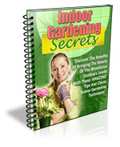Welcome to Gardening Guide
Indoor Hydroponic Gardening Tips Article
 . For a permanent link to this article, or to bookmark it for further reading, click here.
. For a permanent link to this article, or to bookmark it for further reading, click here.
Gardening Tips for Beginners
from:Gardening is a great and rewarding hobby that people in most parts of the world delight in doing. You visually get to enjoy the fruits of your labor along with getting fresh air and exercise at the same time. Sitting down in your front or backyard, putting your feet up and looking at the spectacular masterpiece you created, while you do something you love, is a wonderful feeling. Here are some great gardening tips for beginners just starting out on their gardening hobby journey. Remember that it is possible to create a beautiful garden, even on a tiny piece of land.
There are many gardening tips for beginners that help make new gardeners experiences pleasurable and successful. The two best gardening tips for beginners are to start small but think big. Do not start a gardening project that will take weeks or even months to complete, as this is a guaranteed way to become frustrated and upset. It is amazing how much a person can plant in eighty or one hundred square feet. If you are going to take on a larger project, divide it into sections and work on one at a time. You can enjoy each section as you complete it, build up your confidence and feel positive about the next area you are going to work on. Remember, a smaller garden is far easier to manage, as you learn the necessary basics and secrets on disease, weed and pest control, fertilizing requirements and watering needs. Once you have the skills and confidence, you can go back later and make the garden you designed and planted, larger or create a new one somewhere else.
Some more great gardening tips for beginners are the use of mulch to cut down on the amount of weeding required. While there are gardeners that love working in the soil and weeding, many would rather spend their time, tending the plants or sitting back watching their garden grow. Mulching, besides looking nice, maintains the soils moisture, holds back the weeds and stabilizes the temperature of the soil. Put a couple inches of organic or regular mulch down to save wear and tear on your knees. Another few gardening tips for beginners is that with grass and most plants, watering just a little but often, makes the plants roots stay near the surface of the soil. The best way to maintain healthy plants is to water less frequently but water longer, so you soak the soil well. Do your watering early in the morning. This way the plants leaves will dry during daylight hours thus helping to prevent fungal diseases.
Indoor Hydroponic Gardening Tips News



